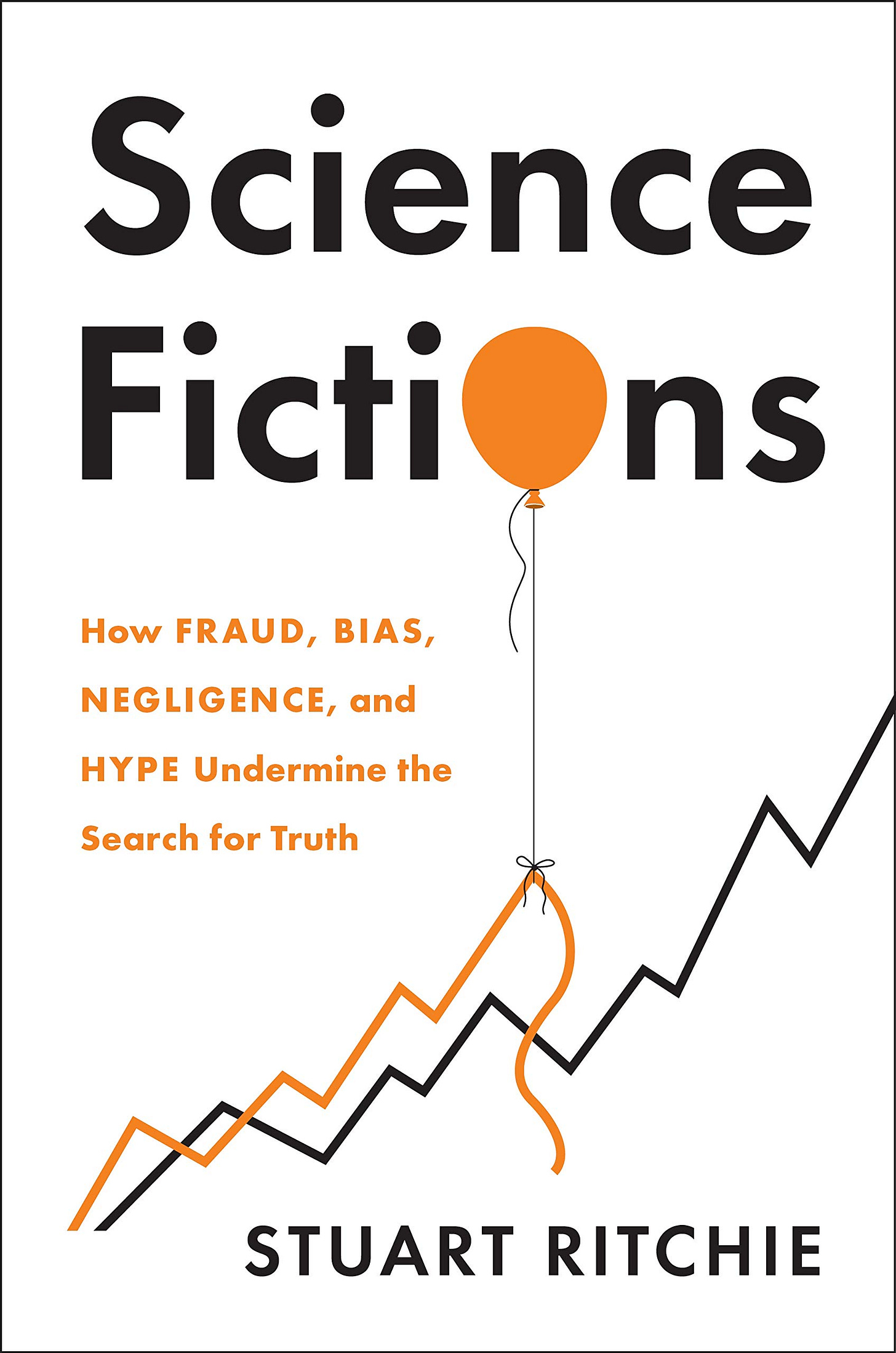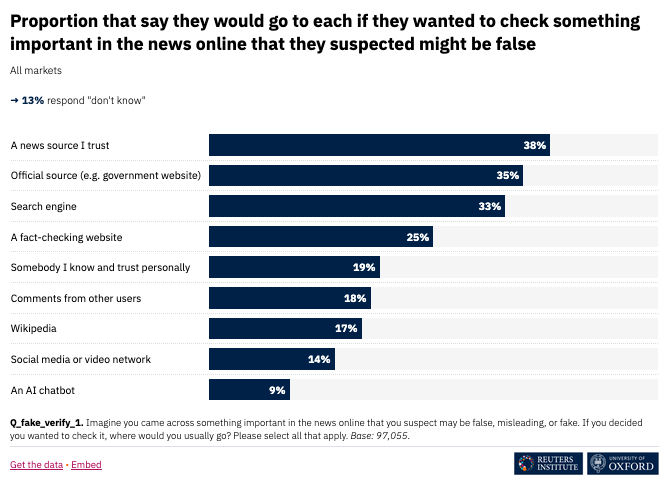The 268th Block: We're in a timeloop
Plus, Reuters Institute released its 2025 Digital News Report
This week…
Your reading time is about 5 minutes. Let’s start.
Reuters Institute released its annual Digital News Report, studying news consumption worldwide. Nothing surprising: Traditional media struggles with engagement and trust, while consumption grows on social media and video platforms through influencers and partisan personalities.
Your Wikipedia this week: Yuasa Phenomenon
And now, a selection of top stories on my radar, a few personal recommendations, and the chart of the week.
ICYMI: The Previous Block was about propaganda and surveillance.
CORRECTION NOTICE: None notified.ON THE MEDIA
Azerbaijan jails 7 journalists in latest media crackdown on free speech
Dasha Litvinova for AP:
A court in Azerbaijan on Friday convicted a Radio Free Europe/Radio Liberty journalist and six others on multiple charges, handing down prison sentences ranging from 7 1/2 to nine years in prison, RFE/RL and local media reported.
The verdict against RFE/RL’s Farid Mehralizada and six journalists from Abzas Media, an independent Azerbaijani investigative outlet, marks the latest escalation in the country’s crackdown on media. All seven journalists have dismissed the charges as politically motivated and linked to their journalism. International rights groups have called for their release.
Mehralizada, an economist who works for RFE/RL’s Azerbaijani service, was sentenced to nine years in prison, the broadcaster reported. Nine-year sentences were also handed to Abzas Media’s director Ulvi Hasanli, chief editor Sevinj Abbasova (Vagifqizi) and investigative journalist Hafiz Babali.
Loosely linked:
How does Israel restrict its media from reporting on the Iran conflict? by Simon Speakman Cordall for Al Jazeera.
Pacific faces ‘critical moment’ in fight for press freedom, media watchdog warns by Kate Lyons for The Guardian.
BBC shelves Gaza doc over impartiality concerns by Steven McIntosh for BBC.
ON AI
Meta’s suit against Hong Kong firm was just the beginning — more companies linked to CrushAI nudify apps
Kolina Koltai and Melissa Zhu for Bellingcat:
Meta announced last week that it was suing Joy Timeline HK Limited (“Joy Timeline”), the Hong Kong-based company it said was behind a group of deepfake “nudifying” apps under “CrushAI”, which include Crushmate. This was following a 404 Media report in January that CrushAI had bought thousands of ads on Instagram and Facebook, using multiple fake Facebook profiles to evade Meta’s moderators.
However, a Bellingcat investigation has uncovered two additional companies in Hong Kong and mainland China — Soul friendship HK Limited (“Soul friendship”) and Wuhan Ruisen Zhuoxin Network Technology Co., Ltd (“Wuhan Ruisen”) — that appear to have links to these apps.
The CrushAI ads showed women, including celebrities and influencers, having their clothes artificially removed using deepfake technology. They led to pages prompting users to upload photos of people and “erase clothes” off them.
Loosely linked:
The AI slop fight between Iran and Israel: There’s a lack of footage from the conflict and AI-generated content is filling the void by Matthew Gault and Emanuel Maiberg for 404 Media.
AI puts real child sex victims at risk, experts say by Lydia Dowling Ranera and Helen Burchell for BBC.
Amsterdam wanted to use AI to make social assistance fairer and more efficient. Things turned out differently by Jeroen van Raalte for Trouw via Pulitzer Center.
Other curious links, including en español et français
LONG READ | How French merveilleux-scientifique fiction reframed reality by Fleur Hopkins-Loféron for Aeon.
INFOGRAPHIC | Mapping the conflict between Israel and Iran by Prasanta Kumar Dutta and Sudev Kiyada for Reuters.
ILLUSTRATED | The Kerch Bridge is ‘doomed’: Series of attacks on the bridge suggests Ukraine’s determination to sever the link to the Russian mainland at all costs by Danylo Hawaleshka for Al Jazeera.
Artistas del ligue ... y otras especies antifeministas por Nuria Alabao en CTXT.
Así es como el ego traicionó al hacker que creó una IA para cometer delitos que triunfaba en España por Carlos del Castillo en elDiario.es.
¿Qué repercusión tiene elXokas hablando de Ábalos? El largo camino de los ‘infuencers’ informativos por Jordi Pérez Colomé en El País.
Comment l’infox française sur "Brigitte Macron femme transgenre" est devenue virale aux Etats-Unis par Laetitia Cherel dans Radio France.
La guerre numérique de Vladimir Poutine : enquête sur les hackers d’État en Russie par Kevin Limonier dans Le Grand Continent.
Sept chiffres pour comprendre l’évolution du racisme dans la société française par Sophie Kloetzli dans Usbek & Rica.
What I read, listen, and watch
I’m reading Science Fictions (2020) by Stuart J. Ritchie. Published pre-mainstreaming of AI, so it’s probably dated now — nonetheless good but frustrating read about scientific fraud. (Ritchie, interestingly, now works for the AI startup Anthropic.)
I’m listening to EFF’s How to Fix the Internet on securing journalism on the data-greedy Internet.
I’m watching Trainwreck: Mayor of Mayhem (2025) on Netflix about the colourful former mayor of Toronto Rob Ford. It was, dare I say, underwhelming.
Chart of the week
How do you check information you think might be wrong? More than a third of respondents from six continents and 48 markets (n=97,055) in Reuters Institute’s survey published in its 2025 Digital News Report check a news source they trust, an official source (e.g. government website) or a search engine.






